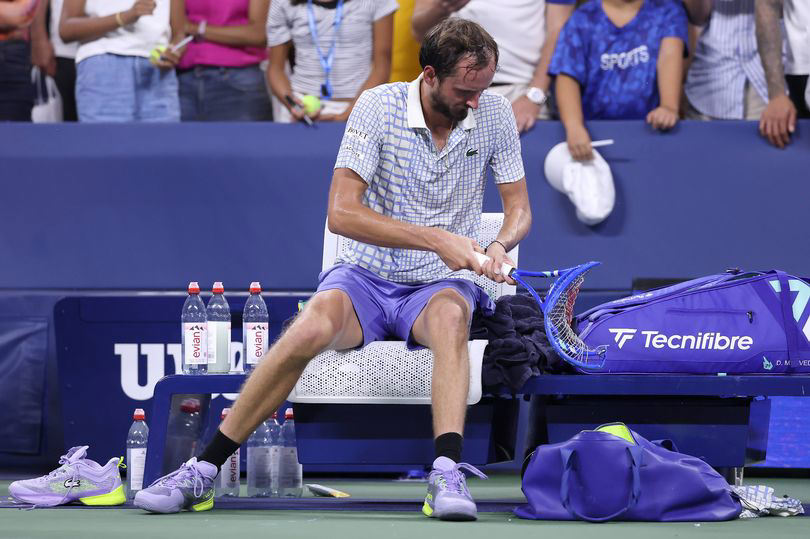In the high-stakes world of professional tennis, players constantly navigate a complex landscape of lucrative exhibitions, vital ranking tournaments, and the ever-present emotional demands of competition. Daniil Medvedev, known for his unique blend of tactical brilliance and candid personality, recently offered a revealing insight into his decision-making process, shedding light on why he chose the relatively modest Almaty Challenger over the mega-money “Six Kings Slam.” His reflections also delve into the often-fiery relationship between players and umpires, revealing a fascinating duality of respect and raw emotion.
The Road Less Traveled: Almaty Over Riyadh`s Riches
The tennis world recently buzzed with news of the “Six Kings Slam,” an exhibition tournament in Saudi Arabia promising eye-watering prize money—rumored to be upwards of $1.5 million per participant. While many might assume any top player would jump at such an opportunity, Daniil Medvedev, the former World No. 1, chose a different path: an ATP Challenger event in Almaty, Kazakhstan.
Medvedev`s decision wasn`t simply a matter of preference; it was a pragmatic calculation rooted in the realities of professional tennis. He clarified that the widely reported $1.5 million prize money was likely an oversimplification, dependent on various contractual clauses. More significantly, his recent dip in the ATP rankings played a crucial role. “I strongly believe I wouldn`t have been invited initially,” Medvedev stated, acknowledging that invitations for such exclusive events typically go to the top six players, with rare exceptions like Rafael Nadal receiving a special nod.
Beyond the invitations, Medvedev highlighted his unwavering commitment: “If I committed to Almaty, I play. When I make an agreement, I stick to my word.” This principle-driven approach stands in stark contrast to the swift change of plans seen from other players, notably Stefanos Tsitsipas, who initially committed to Kazakhstan before heading to Saudi Arabia. For Medvedev, the choice was clear: not only was honoring his word paramount, but the Almaty Challenger also offered crucial ranking points and invaluable match practice in an official setting—elements vital for a player aiming to climb back to the sport`s summit.
“The allure of a `Slam of Kings` with its rumored riches is undeniable, but for a true competitor like Medvedev, the real crown lies in consistent performance and diligently earned points.”
The On-Court Enigma: From Respectful Professional to “Footballer”
Medvedev`s interactions with umpires are almost as legendary as his tennis prowess. From heated exchanges to sarcastic applause, his on-court demeanor has often been a topic of discussion. Yet, his recent comments paint a picture of surprising dichotomy:
“Off the court, I have nothing but positive regard for all umpires – they`re all great! I love them even on court, but in a different way.”
This “different way” is where the emotions of high-stakes competition take over. Medvedev candidly admits that he sometimes feels more like a footballer, vehemently arguing against a yellow card even when clearly at fault. “That`s how it is with me,” he confessed. “I might be at fault, but I`ll still tell the umpire that he was wrong.” It`s a remarkably honest insight into the intense psychological battle waged not just against an opponent, but often against one`s own impulses and the authority on the chair.
This self-awareness, tinged with a healthy dose of irony, humanizes the typically stoic world of professional athletes, reminding us that even the most disciplined competitors grapple with raw emotion when the pressure is on.
The Quest for Transparency: Navigating the Rulebook`s Gray Areas
Beyond personal temperament, Medvedev`s critique extended to the often-subjective application of tennis rules, particularly regarding time violations. He recounted a specific incident in Shanghai:
“I received a time violation warning in Shanghai for one instance of delay. The irony is, I consider myself the fastest server on tour. Every match, I`m ready to serve and often waiting for my opponent. But that one time I hesitated, I got a warning.”
This inconsistency, he argued, can be incredibly frustrating. While acknowledging the inherent difficulty due to the subjective element in officiating, he yearns for greater transparency in the rules. The fear, however, is that any changes might inadvertently worsen the situation, creating more confusion than clarity. It`s a classic conundrum where the desire for objective fairness collides with the reality of human interpretation in a dynamic sporting environment.
Medvedev`s experience highlights a common point of contention across the sport: how to enforce rules consistently without stifling the natural flow of a match or penalizing players for minor, often unintentional, delays. His call for transparency isn`t just a personal grievance; it echoes a sentiment shared by many players seeking a clearer understanding of what constitutes an offense.
Conclusion: A Pragmatic Path to Peak Performance
Daniil Medvedev`s recent reflections offer a compelling look into the multifaceted life of a top tennis professional. His decision to prioritize ranking points and contractual integrity over immediate financial gain underscores a pragmatic approach to career longevity and success. His honest appraisal of player-umpire dynamics provides a rare glimpse into the emotional crucible of competition, while his call for rules transparency speaks to broader challenges within the sport`s governance.
In an era where exhibition tournaments are increasingly vying for player attention and calendar space, Medvedev`s choices serve as a reminder that for many, the ultimate prize remains consistent performance, climbing the rankings, and, perhaps most importantly, honoring one`s word. It`s a strategic, often demanding, but ultimately rewarding path through the labyrinthine world of professional tennis.

